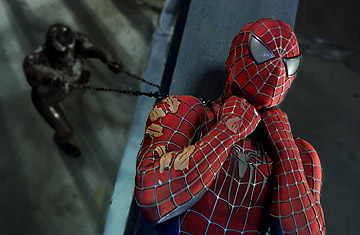
A scene from the film Spider-Man 3.
(2 of 3)
Which could be why I liked it. To place a sensitive story in a male-epic genre — to dramatize feelings of angst and personal betrayal worthy of an Ingmar Bergman film, and then to dress them up in gaudy comic-book colors — is to pull off a smartly subversive drag show. With, yes, 25 mins. of fabulous fights. Peter's tussle with Sandman, and his aerial battle with the supersonic skateboarding New Goblin, are plenty snazzy. But anyone can do that; in action movies, everyone has done that. What's better, in a threequel, is rethinking the characters, the franchise and the genre.
SPI-DENTITY CRISIS
It's not a bad idea for superhero trilogies to follow the formula set down in the Superman films of the late 70s and early 80s. First movie: the hero discovers his secret powers. Second movie: he shares he secret with his girlfriend. The third movie is about how it's not so super being a hero. Success, that cruel muse, threatens to transform him into a corrupt cartoon of his earlier, purer self. Recall that, in Superman III, a blend of kryptonite and tobacco tar split the Man of Steel in half, into good Supe and bad Supe. Christ battles antichrist, and they're the same person.
In Spidey 3, Peter is starting to fall in love with his reputation. It's not enough that he save people; he must be seen saving them. "They love me!" he cries with a dawning pleasure. Celebrity is this superhero's cocaine. The headlines are the high — that, and the attentions of ultra-blond trophy girl Gwen (Bryce Dallas Howard). The "something from outer space" Stewart referred to is really just an expression of the inner conflict between the old and new Peter. "Who are you?" Mary Jane demands, and Peter honestly replies, "I don't know."
What he does know is that he feels a rush in the black suit he never got in the red one. Problem is, Peter is still enough of a nice kid that he can't quite pull off the attendant arrogance. When he combs his hair forward, he's still a dweeb, not a dude. When he tells a villain, "I guess you haven't heard I'm the sheriff round these parts," he's still geeky-gawky, closer to John Mayer than to John Wayne. His attempt at gangsta swagger doesn't cut it either. There's a weird racial aspect to the goo-suit: it gives Peter not just black impulses but a black (Afro-American) attitude. Bopping down the street to a hip-hop rhythm, he's laughably gauche — a white kid playing at soul man, a good kid who's not very good at being baaad.
